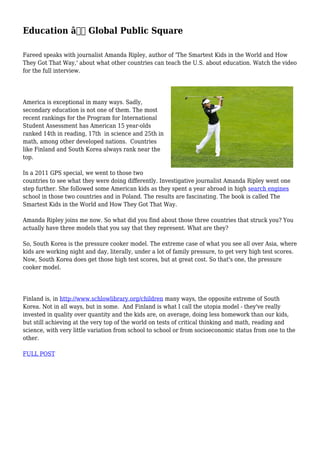Education – Global Public Square
•
0 likes•151 views
Fareed speaks with journalist Amanda Ripley, author of 'The Smartest Kids in the World and How They ...
Report
Share
Report
Share
Download to read offline

Recommended
Recommended
Transcript of Valerie Hannon’s keynote speech at MACBA Auditorium. Barcelona, July 2, 2014. Debates on EducationHow Can We Build Student Engagement and an Educational Community? Valerie Hannon

How Can We Build Student Engagement and an Educational Community? Valerie HannonFundació Jaume Bofill
More Related Content
Similar to Education – Global Public Square
Transcript of Valerie Hannon’s keynote speech at MACBA Auditorium. Barcelona, July 2, 2014. Debates on EducationHow Can We Build Student Engagement and an Educational Community? Valerie Hannon

How Can We Build Student Engagement and an Educational Community? Valerie HannonFundació Jaume Bofill
Similar to Education – Global Public Square (17)
Risky Reading: images and the vision of African education

Risky Reading: images and the vision of African education
How Can We Build Student Engagement and an Educational Community? Valerie Hannon

How Can We Build Student Engagement and an Educational Community? Valerie Hannon
Commitment to Student and Student LearningAdults must be alert.docx

Commitment to Student and Student LearningAdults must be alert.docx
Finland education system a piece of news slideshare

Finland education system a piece of news slideshare
CRITICAL THINKING ASSIGNMENT (120 points) Differential Analysis

CRITICAL THINKING ASSIGNMENT (120 points) Differential Analysis
Discussion Week 4 Possible Effects of Poverty on Young Children’s 

Discussion Week 4 Possible Effects of Poverty on Young Children’s
Research Policy & Evaluation: Checking Assumptions to Accomplish Collaborativ...

Research Policy & Evaluation: Checking Assumptions to Accomplish Collaborativ...
Education – Global Public Square
- 1. Education – Global Public Square Fareed speaks with journalist Amanda Ripley, author of 'The Smartest Kids in the World and How They Got That Way,' about what other countries can teach the U.S. about education. Watch the video for the full interview. America is exceptional in many ways. Sadly, secondary education is not one of them. The most recent rankings for the Program for International Student Assessment has American 15 year-olds ranked 14th in reading, 17th in science and 25th in math, among other developed nations. Countries like Finland and South Korea always rank near the top. In a 2011 GPS special, we went to those two countries to see what they were doing differently. Investigative journalist Amanda Ripley went one step further. She followed some American kids as they spent a year abroad in high search engines school in those two countries and in Poland. The results are fascinating. The book is called The Smartest Kids in the World and How They Got That Way. Amanda Ripley joins me now. So what did you find about those three countries that struck you? You actually have three models that you say that they represent. What are they? So, South Korea is the pressure cooker model. The extreme case of what you see all over Asia, where kids are working night and day, literally, under a lot of family pressure, to get very high test scores. Now, South Korea does get those high test scores, but at great cost. So that's one, the pressure cooker model. Finland is, in http://www.schlowlibrary.org/children many ways, the opposite extreme of South Korea. Not in all ways, but in some. And Finland is what I call the utopia model - they've really invested in quality over quantity and the kids are, on average, doing less homework than our kids, but still achieving at the very top of the world on tests of critical thinking and math, reading and science, with very little variation from school to school or from socioeconomic status from one to the other. FULL POST